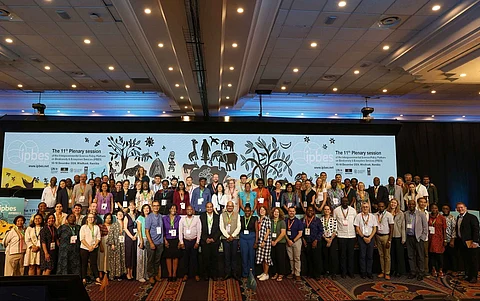

The 11th plenary of Intergovernmental Science-Policy Platform on Biodiversity and Ecosystem Services (IPBES) begins in Namibia on December 10, 2024, to discuss the science and evidence for addressing the global biodiversity crisis.
During the week-long plenary, more than 850 scientists and representatives of more than 150 countries will deliberate on two assessment reports which will be released at the end of the meeting. These reports provide the best-available science and expertise to inform policy and action to tackle biodiversity loss and the degradation of nature’s contributions to people.
The Nexus Assessment explores the link between crises in biodiversity, water, food, health and climate change. It will offer decision-makers options with co-benefits across these challenges, instead of addressing each in silos.
“Global crises in biodiversity, water, food, health and climate change often intensify each other when addressed separately and should therefore be tackled together,” said Paula Harrison, UK Centre for Ecology & Hydrology, Co-chair of the IPBES Nexus Assessment. She added that this assessment is among the most ambitious work ever undertaken by the IPBES community.
The report has been prepared over three years at a total cost of more than US$1.5 million and will be released on December 17, 2024. A total of 165 top international experts from 57 countries, led by two co-chairs used as many as 6,500 references to come up with this report.
The second report is the IPBES Transformative Change Assessment which focuses on the underlying drivers of biodiversity loss and the kind of system-wide changes needed to conserve and restore biodiversity for a more just and sustainable world.
“The IPBES Global Assessment made it clear: the only way to achieve our shared development goals is through transformative change — fundamental system-wide reorganization across technology, economy and society. To do this, we need to better understand the obstacles, but even more importantly the options for action that will bring about a more just and sustainable world,” said Arun Agrawal from the University of Michigan, who is the co-chair of this report.
The second report would be released on December 18, 2024. This report has also been prepared over the last three years, at a total cost of more than US$1.5 million. It has been prepared by 101 top international experts from 42 countries, led by three co-chairs. It draws on roughly 7,000 references.
Delegates would also consider approving the scope of the 2nd Global Assessment of Biodiversity and Ecosystem Services — a follow-up to the seminal 2019 assessment, which alerted the world to the fact that a million species of plants and animals now face extinction.
Pohamba Shifeta, Minister of Environment, Forestry and Tourism of Namibia, called on all stakeholders to strengthen international cooperation, increase financial and technical support for biodiversity-rich nations, and prioritise the inclusion of local communities in conservation strategies.
At the recently held 16th Conference of Parties to the Convention on Biological Diversity, delegates proposed five new topics for assessment by the IPBES. The organisation is considered to be equivalent to the Intergovernmental Panel on Climate Change that guides policies on climate change. This is the first time IPBES is meeting in Africa.